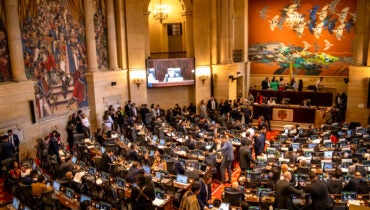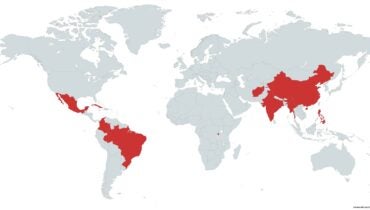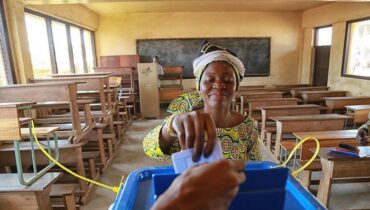The ongoing war and deadly attacks by the Taliban dominate news headlines about Afghanistan. But there’s a more positive story to be told, according to a visiting delegation from the current Afghan government. These young Afghan women have returned to their country—committed, well educated, and capable—and are helping to lead peace building and reconstruction processes.
“We’re not responsible for the destruction,” said panelist Ms. Ghizaal Haress of her country. “But we should be responsible for the reconstruction.”
The lively panel, which began with the women’s personal stories and then moved onto a range of key policy challenges, was cohosted by GIWPS in collaboration with the Foreign Policy program at Brookings and the U.S.-Afghan Women’s Council.
Several inspiring headlines emerged from the discussion, including:
Combating Corruption
“Strong institutions are the missing link in Afghanistan,” according to Ms. Muqaddesa Yourish. At the Independent Administrative Reforms and Civil Service Commission, she is working to restore confidence in civil service and merit-based appointments, stop corruption, and check political patronage.
For a long time, Ms. Yourish said, civil service in Afghanistan has been characterized by nepotism and corruption. Almost daily, she recalled, Afghan civil servants would get calls requesting jobs based on nepotism and cronyism. This is changing. According to Ms. Yourish, the answer to such demands is now more often “no.” Indeed, several panel participants pointed to the emergence of a new sense of identity among government officials beyond ethnic or political interests.
Protecting the Constitution
Ms. Haress of the Independent Commission for the Overseeing of the Implementation of the Constitution works to ensure that fundamental constitutional rights are protected and violations reported. She spoke of the Commision’s recent efforts to build dialogue and engage in constructive relationships with state institutions to foster meaningful reform.
Elevating Women’s Voices
In the post-Taliban era, women of Afghanistan have seen increased standards of living and equality, yet the gains are typically uneven and tenuous. The Women, Peace and Security Index, released by GIWPS last year, ranked Afghanistan second-to-last—just before Syria and Iraq—in terms of women’s inclusion, justice, and security.
Yet women’s voices are being increasingly heard in Afghan politics. Women account for 28 percent representatives in the Afghan parliament, far above the 19 percent share in the United States. Of the dual task facing Afghan women in government, Ms. Shaharzad Abkar said, “We have two jobs: one job is doing our job, our other is doing something for women as well.”
The overwhelming message of the panelists was that of hope—for Afghanistan, and especially for its women. Ms. Adela Raz, Deputy Minister for Economic Affairs at the Foreign Ministry reminded audience members to think of Afghan women as their partners, rather than simply victims.
“I think the women on this panel are a great testimony for Afghanistan moving beyond the victimization of women,” concurred Ms. Yourish, “We are empowered.”
Each of the panelists were born and raised in Afghanistan, then forced to flee. All have returned to rebuild their country and are now serving the Afghan government. “If I didn’t have the highest hopes, I wouldn’t be here in Kabul,” said Ms. Shaharzad Akbar, senior adviser to the President on High Councils.
About GIWPS
GIWPS has a history of elevating Afghan women’s voices.
In 2014, the Institute hosted Secretary John Kerry, Secretary Hillary Clinton, former first lady Laura Bush and a group of Afghan civil society leaders for a conversation on promoting peace and progress in Afghanistan.
In 2016, GIWPS hosted first lady of Afghanistan Mrs. Rula Ghani to discuss Afghan women’s progress, and later that year the Institute published a report on women police officers in Afghanistan.
Most recently, GIWPS hosted the DC premiere of the animated film “The Breadwinner,” with film director Nora Twomey and Mrs. Ghani.
Executive Director Melanne Verveer is a member of the U.S.-Afghan Women’s Council, also housed at Georgetown, and regularly meets and advises women politicians and activists from Afghanistan in Washington.
– Meredith Forsyth is a Georgetown student and a HeForShe fellow with the Georgetown Institute for Women, Peace and Security.


